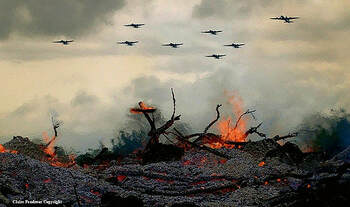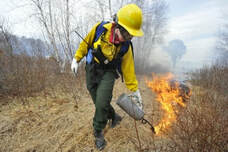|
There are so many things about being a leader that are, well... fun. It's really enjoyable to dream and cast vision. It's great working with a team you love. It's something to wake up to when you realize your day is going to make a difference in someone's life. But it's not all fun and games.  That's why I love what Eric Geiger has always said about leadership. When we step into leadership roles, whether it's in a business or nonprofit or even in a church, we're going to have to start a fire. We'll have incompetence in a staff position, we'll have a moral failure in another leader, we'll deal with brokenness and painfully bad decisions someone else makes, and more. And that's when we have to set a fire. We have to deal with the bad news that we've gotten. Fires aren't fun, ever. They burn, they damage, and even though we all know they're necessary, it doesn't make them any less difficult. The kind of fire we start is what matters.  We can, as leaders, choose to take a Scorched Earth approach. In this, everything gets toasted. You find out something happened and it blows up, literally. Someone in a moral failure is dragged in front of the church and forced to apologize (such as when a young woman gets pregnant outside of marriage, funny the guy doesn't have to wear the scarlet letter). A team member makes a minor mistake and is beat down with a verbal barrage. A family going through difficulty is forced to live it out and even those not affected have to answer. Scorched earth doesn't work. It leaves nothing behind. Leaders fail when they adopt a scorched earth approach because there's nothing left to be redeemed. Sure you got the point across, but what's left behind? Ashes and charred remains. Nothing can grow and nothing can be restored for years, if ever. That said, in very rare and very extreme cases, sometimes you need to just torch everything. News broke this morning of a church leader who ruled with an iron fist and was a dictator. That's a time where the elders and leaders have to torch it. You have to deal hard with hard issues, but only when there's no other option. Same thing where a volunteer or worker gets popped for messing with a kid. There's no "second chance" on that. But these cases are rare and exceptional.  The other approach is the Controlled Burn. One of the perks of living in Florida is we don't have wildfires very often. We get hurricanes, Florida Man, alligators, pythons in ponds, crazy thunderstorms, and Disney tourists. But we don't get wildfires. What's blown me away about wildfires is that one practice to stop a wildfire is to do a controlled burn. In a controlled burn, a fire is carefully set and controlled in order to rob the raging wildfire of its fuel to burn out of control. Leaders who take a controlled burn know there's going to be damage, know there's going to be fallout, know that people will be hurt, know that this isn't going to be much fun. But rather than torch everything, they're careful, intentional, loving, and restorative about the fire they set. In this, there's always the opportunity for redemption. There's always the opportunity for healing and growth. The burn is done in order to minimize damage and maximize hope. Controlled burns don't dismiss the severity of the situation, nor do they give a pass for bad behavior. The fact they're controlled means that the impact is limited to the specific person or situation and doesn't destroy things unnecessarily. Yes there's pain, and as a leader you might have some fallout to deal with. But it's not widespread. It's not catastrophic. And most of all, it's left room for healing and restoration. For a family with a wayward child, it means not condoning but also leaving a light on and coffee on the table. For a staff member with a moral failure, it means discipline and termination but also care and ministry to the family. For the worker who puts a hole in a window, it means paying for the window without dragging their name through the mud on Facebook. Pastors and leaders, how do you make sure you're doing controlled burns?
0 Comments
Leave a Reply. |
Scott M. DouglasA blog about leadership and the lasting legacy of family ministry. Archives
August 2023
Categories
All
|
 RSS Feed
RSS Feed



